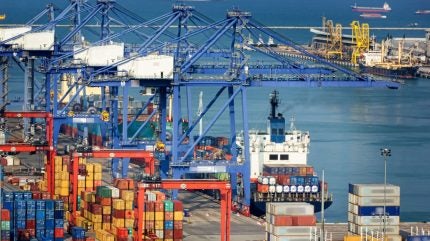
Congestion at the Port of Singapore, caused by increased traffic due to the conflict in the Red Sea, appears to be easing in recent weeks as delays spread between Singapore and Malaysia.
Data on the arrivals at the port shows the total shipping tonnage reaching similar levels to February 2023, while the Maritime and Port Authority of Singapore (PSA) claims to have reduced average vessel wait times to two days or less.
Analysis by booking platform Freightos said: “Congestion is still a factor in Singapore and has led to some spillover to Malaysia. But overall delays have decreased, with vessel wait times under two days in Singapore.
“Shorter wait times at China’s hubs – with congestion there driven by late arrivals from delays at other ports in the region – are also a good sign that system-wide congestion and delays are decreasing.”
Container traffic in Singapore began rising in late 2023 as tensions in the Red Sea region heightened, but the port saw a significant spike at the beginning of 2024 when the Houthi militant group began attacking ships in the region near the entrance to the Suez Canal.
The conflict saw most major container shipping operators choose to avoid transit through the Suez Canal, instead opting to go around the southern tip of Africa for journeys from Asia to Europe and stopping at Singapore on the way.

US Tariffs are shifting - will you react or anticipate?
Don’t let policy changes catch you off guard. Stay proactive with real-time data and expert analysis.
By GlobalDataPSA recently revealed that the percentage of container vessels arriving at the port off-schedule had gone up to 90% in the first half of 2024, from an average of 77% in 2023.
The increased traffic had led PSA to move to expand the capabilities of the port with additional berths being brought back into operation, which, combined with the increased use of Malaysia as an alternative stop for vessels, seems to have eased the issues.
Despite this, PSA CEO Ong Kim Pong recently said he was expecting disruptions to global shipping routes to persist “for a prolonged period” and possibly see port congestion extend to Europe, though Freightos found no evidence of issues at destination hubs.
Kim Pong highlighted the range of steps being taken by PSA to further ease the congestion including working on a series of “Node-to-Network” initiatives designed to improve coordination of upstream and downstream ports to improve efficiency.
He said: “By leveraging our port facilities, supply chain capabilities and especially our people, we remain steadfast in enhancing collaboration with our customers to address their bespoke needs amidst the ever-changing global landscape.”



